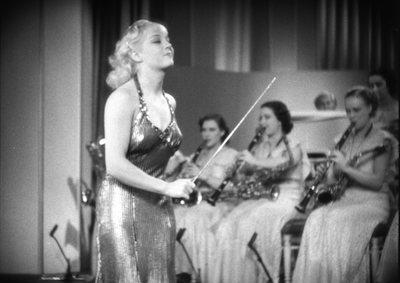Access every screening in the UCLA Festival of Preservation with a $50 pass.
Swing Hutton Swing (1937)
Preservation funding provided by David Stenn.
Singer-dancer Ina Ray Hutton started out on Broadway at age 8 and performed with the big bands of Harry James and Artie Shaw, but it was as a pioneering band leader herself in the 1930s that she made her name. Hutton organized her first all-women big band, Ina Ray Hutton and her Melodears, in 1935. A few film appearances for the band and a starring role for Hutton in Ever Since Venus (1944), along with endless national touring, eventually led her to NBC and a musical variety show in 1956. In this Paramount short, one of a series directed by Fred Waller who went on to invent Cinerama, Hutton—grooving up front in her standard sheer evening dress—and the original Melodears, perform “Organ Grinder’s Swing Overture” followed by The Winstead Trio doing “The Bugle Call Rag.”
35mm, b/w, 10 min. Production: Paramount Pictures. Distribution: Paramount Pictures. Director: Fred Waller. Cinematographer: William Steiner. Jr. Cast: Ina Ray Hutton and her Melodears, the Winsted Trio.
Restored by UCLA Film & Television Archive. Laboratory services by YCM Laboratories, Pacific Title & Art Studio, Fotokem, Audio Mechanics, Simon Daniel Sound, DJ Audio, Inc. Special thanks to Paramount Pictures Archives.
My Lips Betray (1933)
Preservation funding provided by Twentieth Century Fox Film Corporation.
In the mythical kingdom of Ruthania, King Rupert (John Boles) would rather compose music and indulge in expensive whims than deal with his country's ongoing monetary crisis. Lili Wieler (Lilian Harvey) flops in her debut as a singer and, mistaking the King's chauffeur (El Brendel) for Rupert, accepts a ride home in his Majesty's new bing-bang town car. Mesmerized by all of the gadgets, including a television playing a Mickey Mouse cartoon, Lili accidentally leaves a lipstick behind. Gossip flies, and Lili is shortly rumored to be the King's "favorite." Smitten, when he hears Lili sing one of his songs, the King introduces himself as Captain Von Linden. This puts Rupert in the odd situation of battling with himself for Lili's affections.
From the outset, this film depicts the underlying struggle between old world wealth and class consciousness endangered by new world bourgeoisie and modernism. The Queen mother is upset with Rupert's fancy new car and his dalliance with a "tawdry waitress" but at the same time says, "I've half a mind to introduce this American handshake... instead of all this kneeling and bowing." In the film's climax, as Lili strides through the palace looking every bit as audacious as Betty Boop, the soldiers loom over her; protectors of the status quo. In the end it is the discovery of oil (fancy cars are good), true love and music that triumphs over arranged marriages and royal drudgery.
John Boles, best known as the stuffed shirt husband in Stella Dallas, shines in this film, as the completely charming, if not roguish King Rupert. The delightfully refreshing Lilian Harvey would only appear in four movies in her short stint at Fox. Harvey continued to make movies in Germany for UFA until the Nazis took a dim view of her aiding Jewish friends and she was forced to return to the United States, but never resumed her Hollywood career.—Miki Shannon
35mm, b/w, 76 min. Production: Fox Film Corporation. Distribution: Fox Film Corporation. Director: John Blystone. Based on the play His Majesty's Car by Ernest Fisch. Screenwriter: Hans Kraly, Jane Storm, S. N. Behrman. Cinematographer: Lee Garmes. Cast: Lilian Harvey, John Boles, El Brendel, Irene Browne, Maude Eburne.
Restored by UCLA Film & Television Archive in conjunction with Twentieth Century Fox Film Corporation. Preserved from 35mm nitrate dupe picture negative and nitrate composite print. Laboratory services by YCM, Audio Mechanics, Simon Daniel Sound and DJ Audio, Inc. Special thanks to Schawn Belston, Caitlin Robertson, Victoria Stevenson, the Academy Film Archive.






 Mobile Navigation
Mobile Navigation

